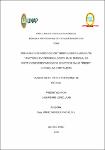| dc.contributor.advisor | Cachique Pinche, Mirle | |
| dc.contributor.author | Lopez Lauri, Jhon Pierre | |
| dc.date.accessioned | 2023-08-21T18:50:16Z | |
| dc.date.available | 2023-08-21T18:50:16Z | |
| dc.date.issued | 2023 | |
| dc.identifier.other | 614.42 L83 2023 | |
| dc.identifier.uri | https://hdl.handle.net/20.500.12737/9294 | |
| dc.description.abstract | The general objective of this study was to determine the prevalence of pulmonary tuberculosis (TB) infection and socio-epidemiological factors in the health personnel of the IPRESS of Yurimaguas Loreto-Peru, based on a quantitative, descriptive-correlational approach methodology, with a nonexperimental and cross-sectional design. The sample consisted of 164 workers from the five IPRESS, to whom a socio-epidemiological survey was applied. The results show a low prevalence of 28% of (TB) in the entire population studied, and by IPRESS a medium level prevalence of 26% was found in Independencia, low in La Loma, Carretera, La Natividad and Aclas Aguamiro 20%, 20%, 17% and 17% respectively. The socio-epidemiological survey showed a population made up of 50% men and 50% women, 58.7% between 18 and 39 years of age, 89.1% with higher education, family income 78.3% between 750 and 3200, 52.2% have between 1 and 3 children, dwellings with 3 rooms 65.2%, 95.7% consume drinking water, most do not consume ambulatory food 58.7%, no history of TB 73.7%, no history of TB 73.7%, no history of TB 73.7%, and no history of TB in the population. 7%, no history of TB 73.9%, 26.1% reported having a family history of TB, 54.3% have been working in the IPRESS for 2 years or more, 100% reported having physical contact with TB patients. When relating the prevalence of (TB) with the socio-epidemiological factors it was found that having physical contact with TB patients was statistically significant with a positive coefficient and a P < 0.05 with a very high Odds ratio. The hypothesis is accepted. In conclusion, having physical contact can help TB transmission 2071 times more than not having contact. | en_US |
| dc.description.abstract | El presente estudio tuvo como objetivo general determinar la Prevalencia de infección a la tuberculosis pulmonar (TB), y factores socioepidemiologicos en el personal de salud de las IPRESS de Yurimaguas Loreto- Perú, centrado en una metodología de enfoque cuantitativo, descriptivo – correlacional, con un diseño no experimental y transversal. La muestra estuvo constituida por 164 trabajadores de las cinco IPRESS, a quienes se les aplicó una encuesta socioepidemiologicos. Los resultados muestran una prevalencia Baja del 28% de tuberculosis pulmonar en toda la población estudiada, y por IPRESS se encontró prevalencia de nivel medio 26% Independencia, baja en La Loma, Carretera, La Natividad y Aclas Aguamiro 20%, 20%, 17% y 17% respectivamente. Los factores de riesgo mediante la encuesta socioepidemiológica muestra una población conformada por el 50% hombres y 50% mujeres, el 58.7 % entre 18 y 39 años, 89,1% con estudio superior, ingreso familiar el 78,3% de 750 y 3200, un 52,2% tienen entre 1 a 3 hijos, las viviendas con 3 cuartos 65,2%, consumen agua potable el 95,7%, la mayoría no consumen alimentos ambulatorios 58.7%, sin antecedentes de TB 73,9%, un 26,1% manifestaron tener antecedente familiares con TB, el 54,3% tienen de 2 años a más trabajando en las IPRESS, el 100 % manifestaron tener contacto físico con pacientes con TB. Al relacionar la prevalencia de (TB) con los factores socioepidemiologicos se encontró que el tener contacto físico con pacientes de TB resultó el único estadísticamente significativa con un coeficiente positivo y un P < 0.05 con un Odds ratio muy alto. Se acepta la hipótesis planteada. valore cercanos no significativos se encuentra el consumo de alimentos ambulatorio 0.075 y 0.094 tener familiares con TB. Conclusión, el tener contacto físico puede ayudar al contagio de TB pulmonar en 2071 veces más que el no tener contacto. | es_PE |
| dc.format | application/pdf | es_PE |
| dc.language.iso | spa | es_PE |
| dc.publisher | Universidad Nacional de la Amazonía Peruana | es_PE |
| dc.rights | info:eu-repo/semantics/openAccess | * |
| dc.rights.uri | https://creativecommons.org/licenses/by/4.0/ | * |
| dc.subject | Epidemiología social | es_PE |
| dc.subject | Investigación sobre servicios de salud | es_PE |
| dc.subject | Prevalencia | es_PE |
| dc.subject | Tuberculosis pulmonar | es_PE |
| dc.title | Prevalencia de infección por tuberculosis pulmonar (TB) y factores socioepidemiológicos en el personal de instituciones prestadoras de servicio de salud “IPRESS”. Yurimaguas Loreto–Perú | es_PE |
| dc.type | info:eu-repo/semantics/bachelorThesis | es_PE |
| thesis.degree.discipline | Ciencias Biológicas | es_PE |
| thesis.degree.grantor | Universidad Nacional de la Amazonía Peruana. Facultad de Ciencias Biológicas | es_PE |
| thesis.degree.name | Biólogo(a) | es_PE |
| dc.subject.ocde | https://purl.org/pe-repo/ocde/ford#3.03.09 | es_PE |
| renati.author.dni | 42893605 | |
| renati.advisor.orcid | https://orcid.org/0000-0002-1561-908X | |
| renati.advisor.dni | 05229957 | |
| renati.type | https://purl.org/pe-repo/renati/type#tesis | es_PE |
| renati.discipline | 511206 | es_PE |
| renati.level | https://purl.org/pe-repo/renati/level#tituloProfesional | es_PE |
| renati.juror | Espinoza Campos, Freddy Orlando | |
| renati.juror | García Dávila, Mildred Magdalena | |
| renati.juror | Ramírez Abanto, Javier | |
| dc.publisher.country | PE | es_PE |





